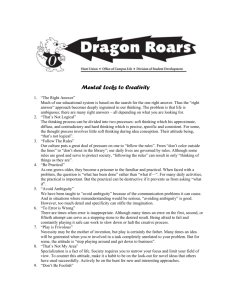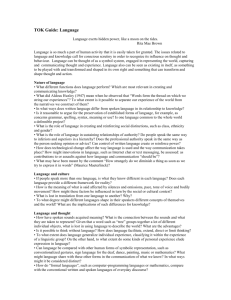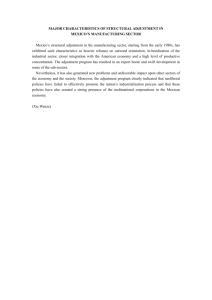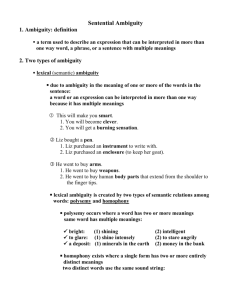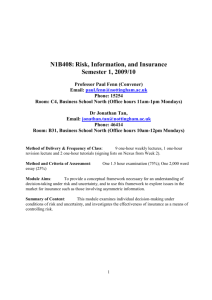ROLE AMBIGUITY? - Regent University
advertisement
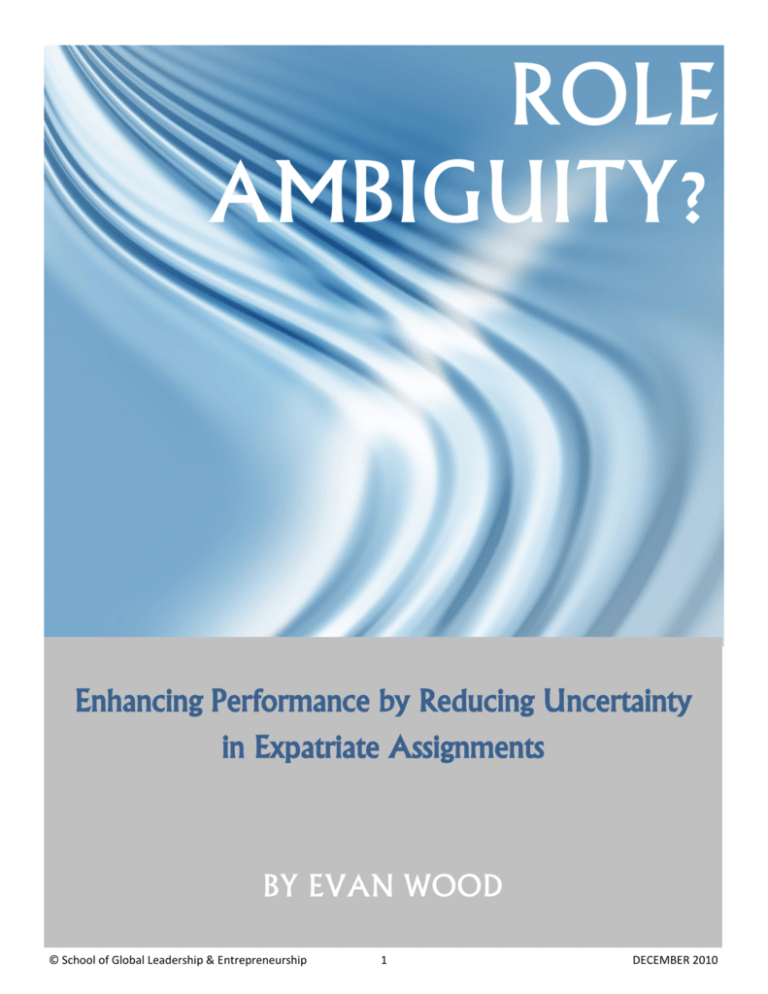
ROLE AMBIGUITY? Enhancing Performance by Reducing Uncertainty in Expatriate Assignments BY EVAN WOOD © School of Global Leadership & Entrepreneurship 1 DECEMBER 2010 Growth in globalization and global markets continues. The recent recession highlighted the interconnectedness of global business, as downturns in any one country have far reaching effects on other countries. Businesses can no longer choose to compete purely local – all businesses compete globally. Globalization continues to result in a highly competitive environment. Most multi-national corporations (MNCs) employ international managers or expatriates to manage global operations, and despite alternative forms of international assignments, evidence continues to support the wide use of expatriates (Collings, Scullion, & Morley, 2007), and there is an expectation for continued use of expatriates. Brookfield Global Relocation Services 2010 Global Relocation Trends Survey, which sampled firms that manage a global workforce of 5.8 million employees, shows that 44% of responding firms project an increase in their expatriate population in 2010, 44% of the firms project their expatriate population to remain flat, and only 12% of the responding firms project a decline in their expatriate population. Additionally, globalization and ease of doing business cross borders has resulted in an increased demand for international managers by small and medium sized organizations, particularly in instances of international joint ventures. Organizational success largely depends on international managers. Failure Historically, expatriate failure has plagued MNCs. The 2010 Global Relocation Trends Survey reported that the Regent Global Business Review turnover rate amongst participants was 17% while on assignment and 38% within one year of return. Additionally, another 7% returned home from the assignment prematurely, but remained with the company (Brookfield Global Relocation Services, 2010). That means nearly 24% of all international assignments resulted in premature conclusions, while over one-third of those with the international experience leave with their new knowledge and experience shortly after returning. Yet, premature departures are only one form of failure. International managers that are not effective, yet remain on assignment, may be even more costly. All types of failure are costly for MNCs. Direct costs of failure include items such as salary, training costs, travel, and relocation expenses. Average compensation ranges between $300,000 and $1 million per year, with early termination of the assignment costing up to $1 million (Wentland, 2003). The cost of a failed assignment results in five to 10 times the cost of a local hire (Carraher, 2005). Indirect costs of failure have greater consequences. Indirect costs of failure include issues such as damaged relations in the host country, low productivity, and loss of market share. Failure is costly to organizations, including missed opportunities, poor productivity, and diminished relationships that can be more costly than financial expenditures. Further, industry surveys indicate a low return on investment (ROI) for long-term international assignments, with 70% of organizations claiming an average, fair, or poor ROI associated with such assignments (McNulty & Tharenou, 2004). Numerous factors have been attributed to the cause of failure. These factors include technical knowledge, personal adjustment to the foreign culture, family adjustment to the foreign culture, and environmental factors. Other factors which emerge as significant include the peculiarities of the host environment and the level of support provided by the headquarters. However, one significant 2 factor that is often overlooked is the clarity of the international manager’s role, resulting in role ambiguity. What is role ambiguity? Role ambiguity is the term used when there is a lack of clarity on the part of an individual about the expectations of the organization and colleagues concerning his or her role within the organization. Role ambiguity is most common in new positions or in positions undergoing change. The four most frequently cited instances of role ambiguity include: (1) uncertainty about how work is evaluated; (2) uncertainty about advancement opportunities; (3) uncertainty about scope of responsibilities; and (4) uncertainty about others’ performance expectations (Handy, 1985). It is expected that a major work role transition such as an international assignment would have some role ambiguity. The basic understanding is that the greater the role ambiguity, the less able individuals are to predict the outcomes of their behaviors (Black, 1988). For example, expatriates with high role ambiguity are less able to predict how others in their organization will respond to decisions they make, causing them to not make necessary decisions. Impact on Adjustment Adjustment to the culture and to the assignment represents a significant concern when employing expatriates. Three major areas of adjustment exist: (1) general adjustment to the culture and non-work environment; (2) interaction adjustment with host nationals; and (3) work adjustment to the new assignment and work environment. The inability to adjust most often results in failure and the resulting high costs. As might be expected, numerous studies have shown a strong negative relationship between role ambiguity and work adjustment. This indicates that the greater the clarity around the international managers role the greater that manager will adjust to the assignment and work environment. In one study of North American expatriates in Ireland, role ambiguity displayed the most signifwww.regent.edu/rgbr FIGURE 1: Expatriate Assignment Cycle icant relationship (negatively) with work adjustment (Morley & Flynn, 2003). In spring 2010, the author surveyed 88 North American expatriates assigned to Hong Kong on a variety of factors that impact adjustment and performance. That studied found reduced role ambiguity to have a positive effect on work adjustment. Further, reducing role ambiguity had the most significant impact on work adjustment, greater than crosscultural training, mentoring, prior experience, language fluency, and compensation. General and interaction adjustment are also negatively impacted by role ambiguity as well. Significant spillover effects were identified between the work and non-work domains. Numerous studies have shown that stressors in one domain spill over into other domains. Thus, the inability to adjust to the new work assignment spills over to non-work domains, hindering the international managers ability to adjust to the general environment and to interacting with host nationals. Impact on Performance With the negative impact role ambiguity has on the three facets of adjustment, it is not surprising that role ambiguity negatively impacts job performance as well. In the study of North Americans working in Hong Kong, role ambiguity exhibited the greatest relationship (negative) with performance. As with work adjustment, reduced role ambiguity exhibited a greater relationship with high performance than any other factor in the study. Individuals tend to divide up their mental and emotional resources among various tasks. With reduced role ambiguity, expatriates’ mental and emotional resources are freer to focus on factors associated with actual job performance as opposed to simply trying to figure out their role. Reducing Role Ambiguity With the clear connection between role ambiguity and reduced adjustment and performance, the question becomes, “how do we reduce role ambiguity.” Three key areas for organizations to consider include: (1) clear purpose and goals of the assignment; (2) clear expectations and responsibilities; and (3) clear levels of authority and decisionmaking capabilities. International managers need to see and understand the clear purpose of the assignment. They need to understand how their role fits in with the organization’s overall strategy globally. Associated with that is the need for clear goals. Clarity around purpose and goals help international managers put their role in perspective. Clear purpose and goals also help host nationals working in the organization gain the proper perspective on the international manager’s role. This clarity helps to create an alignment between the home office and the international location. Consistent with most positions and roles, clear expectations and responsibilities are important for international managers. Complicating this though is the reality that most individuals developing the positions or job descriptions are not familiar with the needs of the international assignment. International managers are often in positions that get developed as they go. This creates great uncertainty for the individual and the host nationals they work with. The international manager has to balance the © School of Global Leadership & Entrepreneurship 3 expectations of the locals as well as those of the home office, which may have conflicting expectations. Setting clear performance expectations and clearly outlining responsibilities helps reduce role ambiguity. Clarifying levels of authority and decision-making capabilities are the final significant area to reduce role ambiguity. International managers are often operating in foreign environments in opposite time zones where they are the face of the organization. Host nationals, both employees and customers, typically expect the international manager to be able to make decisions on behalf of the organization. However, many international managers do not know what types of decisions and commitments are permissible. This tension creates confusion and great stress that can slow them down significantly, hindering performance. Organizations that clearly spell out levels of authority and frameworks for types of decisions that can be made and types of decisions that need input from the home office place their international managers in the best position to succeed. Questions to Evaluate Role Clarity Rizzo, House, and Lirtzman (1970) developed a scale to measure role clarity that DECEMBER 2010 has been used in much of the research. The scale has the following six questions: Resources 1. I feel certain about how much authority I have. Numerous organizations provide consulting and resources for MNCs and expatriates. The following provides a sample of some of the best resources. 2. Clear, planned goals and objectives for my job. 3. I know that I have divided my time properly. 4. I know what my responsibilities are. 5. I know exactly what is expected of me. Global Edge (globaledge.msu.edu): Created by the International Business Center at Michigan State University (IBC), globalEDGE™ is a knowledge web-portal that connects international business professionals worldwide to a wealth of information, insights, and learning resources on global business activities. 6. Explanation is clear of what has to be done. Transitions Abroad (www.transitionsabroad.com): Provides a comprehensive webportal for resources related to work abroad, study abroad, living abroad, and cultural travel overseas. The basis of these answers helps to determine the level of role clarity or role ambiguity. The answers also help to determine where ambiguity in the role might exist. Hewitt Associates (www.hewittassociates.com): Global human resources consulting and outsourcing firm. International website provides access to research and insights. Closing Comments Organizations commit a lot of resources to international operations and international managers during the full expatriate assignment cycle (see figure 1). Over the past decade, global organizations have improved cross-cultural training and other support services for these international managers. However, levels of adjustment or performance do not seem to be improving. The belief of this author is that role ambiguity may be one major factor as to why adjustment and performance is not higher. Creating greater role clarity would seem to be a low investment with high potential returns, especially considering the high costs of employing expatriates. As MNCs move through the expatriate assignment cycle, active thought should be given to creating greater role clarity at each step. Brookfield Global Relocation Services (www.brookfieldgrs.com): Global relocation firm providing relocation and assignment management services. Developed annual Global Relocation Trends Survey and other research and insights. Evan Wood is an assistant professor of Management at Taylor University. In addition to teaching, Evan currently provides consulting to organizations in the areas of management development and coaching, strategic planning, project management, and process review and design. Evan holds a Ph.D. in Technology Management with a concentration in Human Resource Development from Indiana State University. He completed his MBA at Indiana University. Evan has publications journals such as the Journal of European & Industrial Training, Human Resource Development Review, and has presented at numerous conferences including the Academy of Human Resource Development International Conference and the Midwest Academy of Management Annual Conference. Regent Global Business Review 4 www.regent.edu/rgbr NOTES Black, J. (1988). Work role transitions: A study of expatriate managers in Japan. Journal of International Business Studies , 19, 74-96. Brookfield Global Relocation Services. (2010). Global Relocation Trends: 2010 Survey Report. Carraher, S. (2005). An examination of entrepreneurial orientation: A validation study in 66 countries in Africa, Asia, Europe, and North America. International Journal of Family Business , 2, 95-100. Collings, D., Scullion, H., & Morley, M. (2007). Changing patterns of global staffing in the multinationalenterprise: Challenges to the conventional expatriate assignment and emerging alternatives. Journal of World Business , 42, 198-213. Handy, C. (1985). Understanding Organizations. London: Penguin Books. Konivuori, S. (2005). Expatriate assignment cycle. Retrieved August 10, 2010 from http://moniviestin.jyu.fi/ohjelmat/hum/viesti/en/ ics/50. McNulty, Y., & Tharenou, P. (2004). Expatriate return on Investment: A definition and antecedents. International Studies of Management & Organizations , 34 (3), 68-95. Morley, M., & Flynn, M. (2003). The relationship between work-role characteristics and intercultural transitional adjustment domain patterns among a sample of US and Canadian expatriates in Ireland. Cross Cultural Management , 10 (3), 42-57. Rizzo, J. R., House, R. J., & Lirtzman, S. I. (1970). Role conflict and ambiguity in complex organizations. Administrative Science Quarterly , 15 (2), 150-163. Wentland, D. M. (2003). A new practical guide for determining expatriate compensation: the comprehensive model. Compensation and Benefits Review , 35 (3), 45-50. © School of Global Leadership & Entrepreneurship 5 DECEMBER 2010


